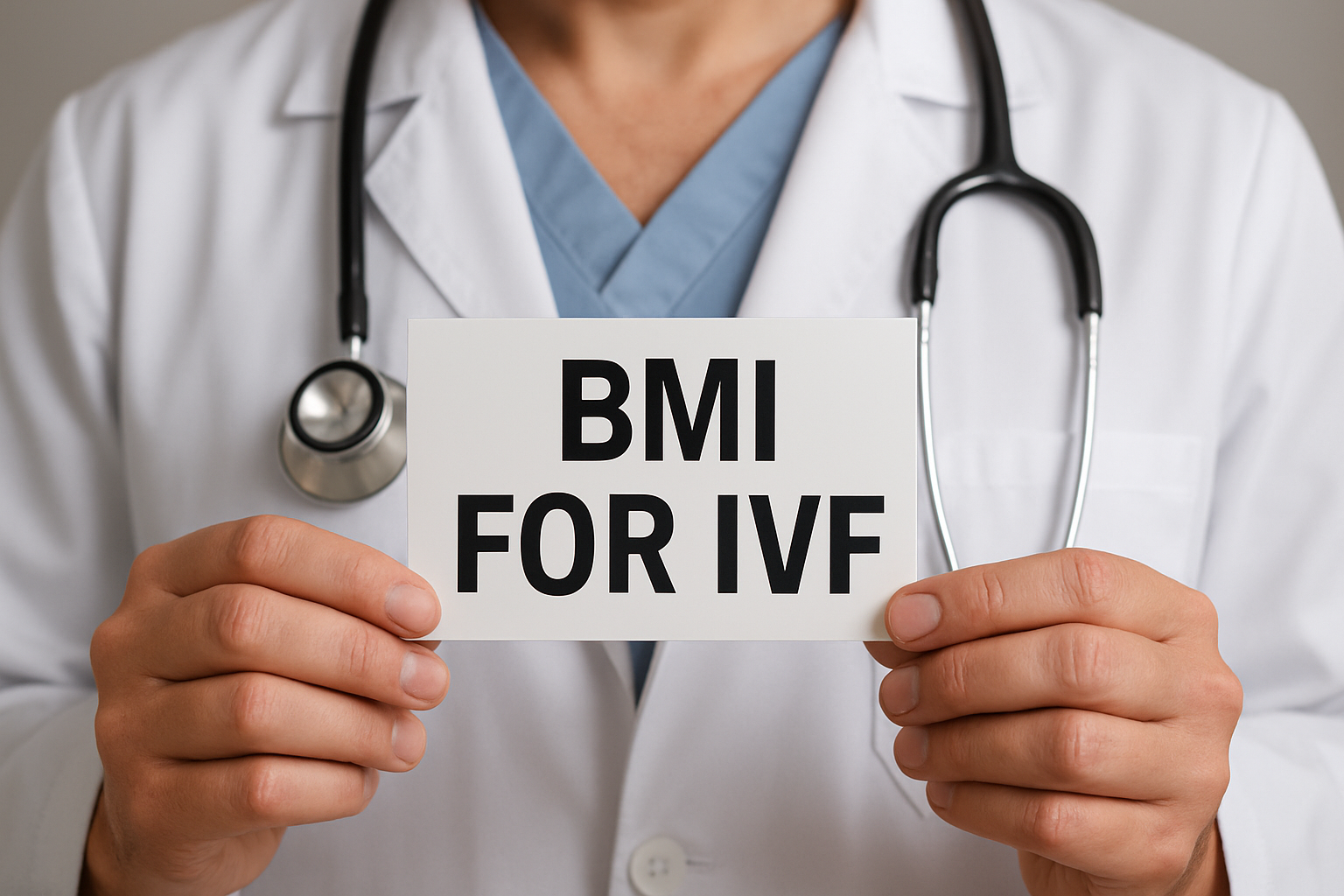
BMI for IVF is one of the most important factors clinics consider before starting treatment. Body mass index (BMI) not only influences fertility potential but also determines whether a patient qualifies for IVF. Understanding how BMI affects success rates, risks, and clinic eligibility is essential for couples planning their journey.
Why Is BMI Important In IVF Treatment?
When preparing for IVF, one of the first assessments a clinic performs is calculating BMI. Many patients ask: what does your bmi have to be for ivf? The answer lies in understanding how BMI influences fertility, embryo development, and the safety of both mother and baby. A balanced BMI ensures that the body can respond well to fertility medications, produce quality eggs, and sustain a healthy pregnancy.
How Body Weight Affects Fertility
A frequent question is: what bmi do you need for ivf? While ranges vary, clinics usually recommend staying within certain limits to maximize fertility potential. Both underweight and overweight patients may face challenges because body weight directly influences reproductive health.
- Hormonal imbalances: Low BMI can reduce estrogen production, while high BMI increases estrogen, disrupting ovulation.
- Egg and sperm quality: Poor BMI levels are linked to weaker egg development and reduced sperm count in men.
- Medication effectiveness: IVF drugs may work less efficiently, requiring higher doses and longer cycles.
Maintaining a healthy body weight increases the chances of conception both naturally and with IVF.
IVF Success Rates And BMI Connection
Another common concern is: what does your bmi need to be for ivf in order to boost success rates? Studies consistently show a direct link between BMI and IVF outcomes.
- Higher BMI: Women with obesity tend to have lower implantation rates and higher miscarriage risks.
- Lower BMI: Women who are underweight may produce fewer eggs and embryos, reducing success rates.
- Balanced BMI: Staying within the recommended range improves the response to stimulation, egg quality, and embryo implantation.
Therefore, BMI is not only a requirement for IVF eligibility but also a determining factor for success.
Risks Of Very Low Or High BMI
Clinics often define a bmi limit for ivf because extremes in BMI can pose significant risks.
- Very low BMI:
- Increased risk of failed embryo transfer.
- Higher chance of miscarriage due to poor uterine lining development.
- Very high BMI:
- Greater likelihood of gestational diabetes, preeclampsia, and stillbirth.
- Technical difficulties during egg retrieval and pregnancy monitoring.
By setting clear BMI guidelines, clinics protect patients from unnecessary health complications while improving IVF outcomes.
What Is The Recommended BMI Range For IVF?
Every IVF clinic has slightly different requirements, but most agree that a balanced BMI is essential for safe and effective treatment. Understanding the recommended range helps patients prepare before beginning the IVF journey. By keeping BMI within a healthy window, couples improve their chances of conception, healthier embryo development, and reduced pregnancy risks.
Typical BMI Range Accepted By Clinics
Patients often ask: what bmi for ivf is generally required? Most clinics set a minimum BMI of around 18–19 and a maximum range between 30–35. These values ensure that the patient is healthy enough to respond to treatment and carry a pregnancy safely.
- Minimum BMI requirement:
- Below 18, ovulation may stop, making IVF less effective.
- Maximum BMI requirement:
- Above 35, complications increase, and many clinics restrict treatment.
- Typical eligibility window:
- 19–30 is usually considered the optimal range for IVF.
While exceptions exist, staying within these limits gives patients the best chance for success.
Why A Balanced BMI Improves Outcomes
Patients often wonder: bmi needed for ivf to get the best outcome. The answer lies in balance. A healthy BMI supports every stage of treatment, from stimulation to pregnancy.
- Medication response: Balanced BMI patients respond more consistently to fertility drugs.
- Egg quality: Proper BMI levels support stronger eggs, better embryos, and healthier pregnancies.
- Reduced complications: Women within the target BMI range face fewer risks of gestational diabetes, preeclampsia, and delivery problems.
Maintaining weight within the recommended range gives both the mother and baby the healthiest start possible.
When To Consult A Specialist About BMI
If you’re unsure about your BMI before treatment, consulting a fertility specialist is essential. Doctors can guide you toward the right adjustments and explain the connection between BMI and IVF. Many patients ask: what does your bmi need to be for ivf, but this varies depending on health history, age, and clinic policies.
- When to seek help:
- If your BMI is below 18 or above 30.
- If weight-related health conditions affect fertility.
- If previous IVF cycles were unsuccessful due to weight issues.
By addressing BMI early, patients can avoid delays in treatment and increase their overall chance of IVF success.
Maximum BMI Limit For IVF Procedures
Every clinic sets its own policies, but most establish a clear bmi cut off for ivf to protect patient safety and maximize success rates. These cut-off points are not meant to exclude patients but to ensure the body can handle fertility treatment and pregnancy safely.
- Standard cut-off levels:
- Many clinics set 35 as the maximum BMI for IVF.
- Some stricter clinics may use 30, while others extend eligibility up to 40 depending on patient health.
- Reasons for the cut-off:
- Medical risks like gestational diabetes, miscarriage, and delivery complications.
- Technical difficulties with anesthesia and egg retrieval procedures.
- Lower success rates in higher BMI groups.
- Exceptions:
- Certain clinics allow treatment beyond the usual limit if overall health is stable and closely monitored.
Knowing the clinic’s BMI threshold before starting treatment helps patients plan lifestyle changes early on.
IVF Options For Patients With High BMI
Patients searching for ivf for high bmi often feel discouraged by strict clinic rules. However, treatment is still possible with the right approach. Clinics are increasingly offering tailored options to help overweight patients begin IVF safely and effectively.
- Initial health assessment: Doctors check cardiovascular health, blood sugar, and hormonal balance before approving treatment.
- Weight management support: Clinics may recommend dieticians, exercise programs, or medication to help reduce BMI.
- Modified IVF protocols: Adjusted dosages and monitoring can improve response to treatment despite a higher BMI.
- Alternative options: In cases where BMI is above the safe threshold, doctors may suggest waiting until weight is stabilized.
High BMI does not necessarily mean IVF is impossible, but it requires more careful planning and medical oversight.
Challenges Of Undergoing IVF At A High BMI
Patients often ask: what bmi for ivf is too high? Those above the cut-off may face significant obstacles.
- Lower stimulation success: High BMI patients often need stronger or longer fertility medication cycles.
- Technical difficulties: Egg retrieval and embryo transfer procedures can be more complex.
- Reduced implantation chances: Embryos may have a harder time attaching to the uterine lining in women with higher BMI.
Despite these challenges, clinics can still adapt treatments to help patients with elevated BMI start their journey.
Medical Risks And Pregnancy Complications
One of the biggest concerns around high BMI is safety. For example, patients asking about max bmi for ivf should understand the risks involved.
- During treatment:
- Higher risk of ovarian hyperstimulation syndrome (OHSS).
- Increased anesthesia complications during egg retrieval.
- During pregnancy:
- Greater chance of gestational diabetes and hypertension.
- Increased likelihood of cesarean delivery.
- Higher miscarriage and stillbirth risks.
These risks explain why most clinics set a strict BMI limit before approving IVF.
Supportive Treatments For High BMI Patients
Although the road may be more challenging, supportive measures can make IVF possible for overweight patients. Clinics may focus on bmi needed for ivf success through additional treatments.
- Lifestyle programs: Nutritionists and fitness experts can help patients reduce BMI safely.
- Medical weight management: Medication or bariatric surgery may be suggested for those with severe obesity.
- Specialist monitoring: Extra scans, blood tests, and medical reviews throughout IVF and pregnancy.
With professional support, even patients with higher BMI can still work toward a successful IVF outcome.
Private IVF Clinics And BMI Flexibility
Not all fertility clinics apply the same strict BMI rules. While public healthcare systems often follow rigid eligibility criteria, private clinics may offer more flexibility. Patients researching the maximum bmi for ivf will find that some private clinics are willing to treat individuals beyond the usual cut-off, provided that health risks are manageable.
- Why private clinics are more flexible:
- They can tailor treatments to individual health needs rather than follow fixed national guidelines.
- They often provide additional monitoring and personalized medication adjustments.
- Patients receive more time and attention from specialists, improving safety in higher-risk cases.
Choosing a private clinic may open doors for patients who would otherwise be excluded from IVF due to BMI restrictions.
BMI For Private IVF
A common concern among patients is whether there are special rules about bmi for private ivf. The answer is that private clinics do set limits, but these are often higher or more adaptable compared to public options.
- Typical private thresholds: Some clinics may accept patients up to a BMI of 40 if overall health is stable.
- Case-by-case assessment: Doctors focus on blood pressure, cardiovascular health, and metabolic conditions rather than BMI alone.
- Extra safety measures: Enhanced monitoring, tailored medication protocols, and specialist care teams are usually included.
Private clinics give patients with higher BMI a realistic chance to pursue IVF while ensuring risks are carefully managed.
Best BMI For IVF Success Rates
Many patients are not only concerned with the minimum or maximum limits but also want to know the healthy bmi for ivf that leads to the best outcomes. Generally, being within a normal BMI range improves fertility, egg quality, and pregnancy safety.
- Healthy range: Most research suggests a BMI between 19 and 25 offers the best chance for success.
- Improved hormone balance: Within this range, estrogen and progesterone remain stable, supporting ovulation and implantation.
- Lower complication risk: Women in the healthy BMI bracket face fewer medical challenges during both treatment and pregnancy.
By aiming for this range, couples can optimize their chances of both conceiving and carrying a healthy pregnancy.
Ideal BMI For Improved Egg Quality
Many couples wonder about the best bmi for ivf in terms of egg quality. Studies show that women within the healthy BMI range typically produce better-quality eggs and embryos, directly increasing pregnancy rates.
- Egg development: Balanced BMI supports ovarian response and increases the number of high-quality eggs.
- Embryo health: Proper BMI reduces genetic abnormalities and improves implantation potential.
- Long-term pregnancy success: Women within the ideal BMI have higher live birth rates compared to those outside the range.
Maintaining a steady, healthy weight is one of the most effective ways to prepare for successful IVF treatment.
Implantation And BMI Correlation
Successful implantation is one of the most delicate stages of IVF, and BMI plays a crucial role. Women within the recommended BMI range are more likely to achieve strong endometrial development, which supports embryo attachment.
- High BMI impact: Excess fat tissue can lead to higher estrogen levels, disrupting the uterine environment.
- Low BMI impact: Thin endometrial lining is common, making implantation more difficult.
- Balanced BMI benefit: Provides the optimal hormonal and physical conditions for implantation and sustained pregnancy.
Focusing on BMI before IVF not only increases chances of conception but also ensures a healthier journey toward parenthood.
Frequently Asked Questions About BMI And IVF
What BMI Do You Need To Qualify For IVF?
A frequent question is: what bmi do you need for ivf? Most clinics require a BMI between 19 and 30 to qualify. Some clinics allow up to 35 if overall health is good, but anything outside these limits may reduce success rates or pose health risks.
Is There A Maximum BMI Cut-Off In IVF?
Yes, clinics often set a bmi cut off for ivf to ensure safety. The typical cut-off is 35, though some clinics set it lower (around 30) or higher (up to 40). This helps reduce pregnancy complications and improves treatment outcomes.
Can IVF Be Successful With A High BMI?
Patients often ask if IVF is possible with a high BMI. The answer is yes, but success rates are lower compared to women in the recommended range. Clinics offering ivf for high bmi cases usually provide specialized protocols and extra monitoring to improve the chances of success.
What Is The Healthiest BMI For IVF?
Many women want to know the healthy bmi for ivf. Research suggests the healthiest range is between 19 and 25. Staying in this range supports better egg quality, higher implantation success, and fewer pregnancy complications.
Does BMI Affect Private IVF Eligibility?
Yes, but private clinics are generally more flexible. Patients often search for bmi for private ivf, and the good news is that private clinics may accept patients with a BMI up to 40, depending on their overall health. They take a more individualized approach, assessing risks and providing additional monitoring throughout treatment.





